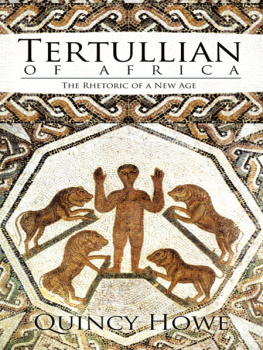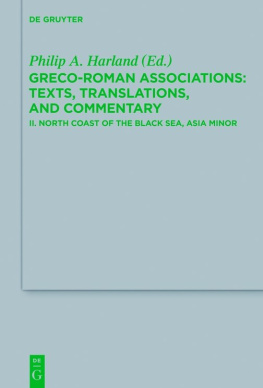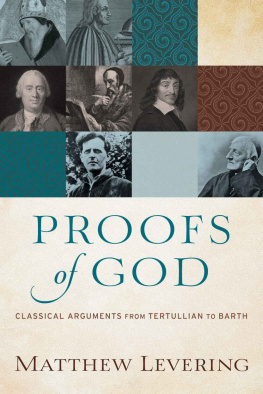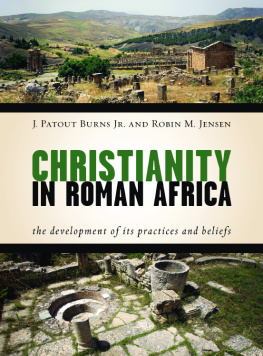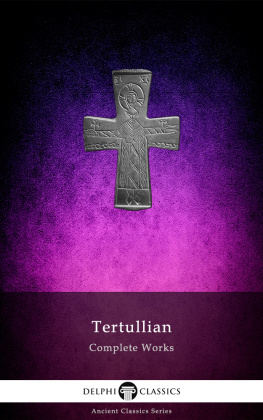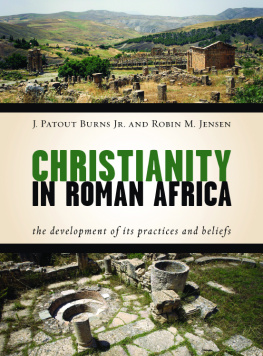Quincy Howe - Tertullian of Africa: The Rhetoric of a New Age
Here you can read online Quincy Howe - Tertullian of Africa: The Rhetoric of a New Age full text of the book (entire story) in english for free. Download pdf and epub, get meaning, cover and reviews about this ebook. year: 2011, publisher: iUniverse, genre: Religion. Description of the work, (preface) as well as reviews are available. Best literature library LitArk.com created for fans of good reading and offers a wide selection of genres:
Romance novel
Science fiction
Adventure
Detective
Science
History
Home and family
Prose
Art
Politics
Computer
Non-fiction
Religion
Business
Children
Humor
Choose a favorite category and find really read worthwhile books. Enjoy immersion in the world of imagination, feel the emotions of the characters or learn something new for yourself, make an fascinating discovery.
- Book:Tertullian of Africa: The Rhetoric of a New Age
- Author:
- Publisher:iUniverse
- Genre:
- Year:2011
- Rating:5 / 5
- Favourites:Add to favourites
- Your mark:
- 100
- 1
- 2
- 3
- 4
- 5
Tertullian of Africa: The Rhetoric of a New Age: summary, description and annotation
We offer to read an annotation, description, summary or preface (depends on what the author of the book "Tertullian of Africa: The Rhetoric of a New Age" wrote himself). If you haven't found the necessary information about the book — write in the comments, we will try to find it.
Tertullian, a Roman citizen living in North Africa, wrote with startling ease and insight about early Christian beliefs. This book contains translations of his essays On the Testimony of the Soul and To the Nations, Volume I. There us a considerable notation and supporting material inserted within the text.
Tertullian of Africa: The Rhetoric of a New Age — read online for free the complete book (whole text) full work
Below is the text of the book, divided by pages. System saving the place of the last page read, allows you to conveniently read the book "Tertullian of Africa: The Rhetoric of a New Age" online for free, without having to search again every time where you left off. Put a bookmark, and you can go to the page where you finished reading at any time.
Font size:
Interval:
Bookmark:
Tertullian of Africa
The Rhetoric of a New Age
Quincy Howe, PhD
iUniverse, Inc.
Bloomington
Tertullian of Africa
The Rhetoric of a New Age
Copyright 2011 by Quincy Howe, PhD.
All rights reserved. No part of this book may be used or reproduced by any means, graphic, electronic, or mechanical, including photocopying, recording, taping or by any information storage retrieval system without the written permission of the publisher except in the case of brief quotations embodied in critical articles and reviews.
iUniverse books may be ordered through booksellers or by contacting:
iUniverse
1663 Liberty Drive
Bloomington, IN 47403
www.iuniverse.com
1-800-Authors (1-800-288-4677)
Because of the dynamic nature of the Internet, any web addresses or links contained in this book may have changed since publication and may no longer be valid. The views expressed in this work are solely those of the author and do not necessarily reflect the views of the publisher, and the publisher hereby disclaims any responsibility for them.
Any people depicted in stock imagery provided by Thinkstock are models, and such images are being used for illustrative purposes only.
Certain stock imagery Thinkstock.
ISBN: 978-1-4620-6452-6 (sc)
ISBN: 978-1-4620-6453-3 (ebk)
Printed in the United States of America
iUniverse rev. date: 01/06/2012
Contents
The Life of Tertullian
Tertullians life is not a dramatic story consisting of major assignments, positions, and accomplishments. His personal narrative can be reduced to a single sentence: He was an exceptional writer of great prolixity and originality. The available facts are few in number and often subject to debate.
He was born in the city of Carthage around 160 AD. The Carthaginians fought three major wars with the Romans and their city was destroyed by Scipio Africanus in 146 BC. This is important information because it places Carthage at a unique position in Roman history. In the pre-Christian era Carthage had been Romes most menacing enemy. In the Christian era it was the country of origin for Tertullian, St. Cyprian, and St. Augustine, all three of them major forces in the emergence of the Catholic faith. The classical tradition, launched by writers such as Virgil, Cicero, Quintillian, and Seneca did not feed into the formation of Christian thought. As the classical tradition was fading, these African successors from Romes ancient enemy launched the wording and perception of reality that became western Christianity.
I can provide no more than a couple of facts about Tertullian and the works I am translating. They are Ad Nationes I, To the Nations Book I composed in 197 AD and De Testimonio Animae, On the Testimony of the Soul., composed in 197-98 AD.
There is no evidence that he was raised as a Christian, which leads to the surmise that he was a convert. He was married and it is evident from his writings that his wife was also Christian. There is some debate about his training. He clearly had ample rhetorical training. He was also very familiar with judicial procedure; however, this was true of rhetoricians in general. There are intimations that he may have been a priest, but no more than intimations.
Later in life he drifted away from mainstream Christianity and became a Montanist, a Christian sect that attached extreme significance to the power of the Holy Spirit. The general consensus is that Tertullian did not actually abandon Christianity. These are the salient known facts about the life of Tertullian.
Tertullian as a Writer
Tertullian is an extraordinary presence both in the history of Christian thought and in the development of Latin prose. He wrote about Christianity and its pagan critics with an immediacy that was evident from his earliest works. Tertullian is rumored to have advanced to considerable old age. There are those who like to surmise that he lived as late as 249 AD. On the other hand, to judge by his writings, which end in 222 AD, he would have lived at least to the age of sixty-two. There are thirty-one extant works attributed to Tertullian. These are polemics, eulogies, and a broad range of cultural essays. As I hope to make evident from the two works I am offering in translation, he writes with fervor and ease. These two pieces were written largely for pagan instruction. The pagans were persecuting the Christians both for their reported vices and their unwillingness to accord to the Emperor the vow of unswerving loyalty.
As for the reported vices of the Christians, Tertullian takes deep pleasure in exercising his vexation and incredulity of the vices that had become associated with the Christian name. There were rumors of incest, infanticide, and dining on pieces of bread dripping with human blood. And Tertullian presents them with vividness and a sense of dismissive mockery. The reader is drawn into the position to reflect on how the devout new Christian, willing to die for his faith, could possibly engage in these vices associated with the Christian faith while rejoicing in the promise of Resurrection and Gods unfailing forgiveness.
A major driving forces behind Tertullians style is the rhetorical movement known as the Second Sophistic, which was flourishing toward the end of the second century AD. The devices at his disposal are irony, paradox, and sarcasm. In his essay On the Testimony of the Soul, Tertullian finds himself in touch with a resource, namely his soul, which operates through direct disclosure rather than through the labored convolutions of the mind.
One of Tertullians cherished assumptions is that the pagans, despite their persecution of the Christians and their relentless disapproval of Christian vices, have a profound affinity with the Christians. If they could just set aside their harangues against the reported vices, they might recognize that the pagans and the Christians occupy a common ground. Despite the persecutions and the judicial accusations of flagrant Christian malfeasance, the pagans need to view the Christian position with some of the irony and paradox that permeate the Second Sophistic.
In the pages that follow I am presenting translations supported by commentary that should draw attention to the common ground available to all in second century Carthage.
In the midst of these tumultuous and menacing realities, Tertullian produced a body of work that is unique in its presentation of Christian belief. What I would like to attempt in this study is to single out those features of the Christian experience that most immediately and persuasively moved Tertullian. I am including only two works: On the Testimony of the Soul and Ad Nationes.Book I . The first of these is characterized by an attitude of worshipful reverencenot a recurrent posture in Tertullian. Ad Nationes is a diminutive specimen of Tertullians most forceful work, The Apology . In both the Apology and the ad Nationes Tertullian belabors the myriad paradoxes and contradictions that arise from the pagan assault on Christianity. Tertullian is aware of the many ways in which the pagans are appropriate candidates for Christian conversion.
I will start with On the Testimony of the Soul where Tertullian tries to explain what has provided both the evidence and the assurances that sustain his Christian belief. As he quotes what he takes to be the spontaneous self-disclosures of his soul, we must remain mindful of the fact that Tertullian is writing at a time when the soul did not have self-evident access to inspired and revealed truth. He is constrained by the intimations, perceptions, and reflections that come to him as the spontaneous expressions of his soul.
Another source of inspiration for Tertullian was the realization that the Christians had been summoned to embrace a truth that demanded the ultimate sacrifice and delivered ultimate benediction. There is a very considerable body of writing among the early Church fathers about the sacrifice and sanctity of the martyrs. For the Christian who may be experiencing a moment of dejection and apprehension, there is in Tertullians famous line, Cristianus ad leonem (Christian to the lion) a shudder of reassuring defiance.
Next pageFont size:
Interval:
Bookmark:
Similar books «Tertullian of Africa: The Rhetoric of a New Age»
Look at similar books to Tertullian of Africa: The Rhetoric of a New Age. We have selected literature similar in name and meaning in the hope of providing readers with more options to find new, interesting, not yet read works.
Discussion, reviews of the book Tertullian of Africa: The Rhetoric of a New Age and just readers' own opinions. Leave your comments, write what you think about the work, its meaning or the main characters. Specify what exactly you liked and what you didn't like, and why you think so.

